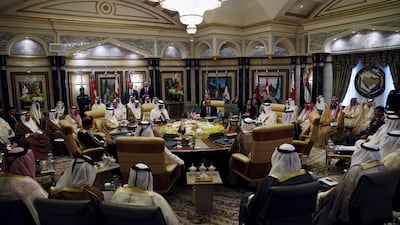Marshall McLuhan's famous observation that sometimes "the medium is the message" perfectly describes the substance of last week's US-GCC summit. The meeting itself, especially its now-confirmed annual status, is the biggest takeaway for both sides.
For the United States, an annual leadership summit is one of the main things it could do to reaffirm its partnership with the Gulf states. After all, the American military presence in the region, especially given the absence of a major combat mission, is already historically high, as are weapon sales, financial investments, diplomatic interchange and civil society interaction.
Despite the impression in Gulf societies that the United States has been disengaging, the reality is that, at a practical level, there’s not that much more that could be done to increase US engagement.
What the United States had left to offer that is politically possible is what Barack Obama referred to as “institutionalised communication” with the Gulf states. The annual summits give the Gulf states very unusual regular access to American decision-making at the highest possible level. It’s a format rather than a substantial takeaway, but that doesn’t lessen its practical and symbolic value.
The institutionalisation of an annual US-GCC Summit confirms the strength of the partnership and the extent to which, no matter what the doubts and tensions on both sides might be, the two sides still need each other because they lack alternatives.
They came together out of mutual interests, not shared values or love. And they are sticking together because those interests remain substantially unchanged. Both sides have plainly been considering their options in recent years, but, in reality, there are no alternatives to each other given what Arab and American interests really are.
Mr Obama, predictably, did a creditable job in downplaying tensions in the relationship, dismissing them as “tactical differences” for achieving common strategic goals. To some extent that’s true, on issues such as Iran and Syria in particular, but some of his personal opinions remain problematic.
When Mr Obama speaks, as he did during the summit, as president, his words reflect US policy and are therefore almost entirely unobjectionable because US policy is sound. However, as is well known, some of his personal views have created great anxiety among US Gulf partners.
However, Mr Obama’s personal opinions, such as the ideas that the Gulf Arab states are “free riders” in the relationship, or that they should “share” the Middle East with Iran, or that the United States should “pivot to Asia”, are precisely that: his private views. They are not American policy.
No one’s opinions are more important than those of the US president in shaping American policy. But the American president is not a king or a dictator, and US policy is made gradually and with many inputs. Almost none of Mr Obama’s problematic opinions are reflected in either American conduct or policy documents.
Therefore, it’s not surprising that the Obama who showed up in Saudi Arabia comes across as a very different person from the one depicted in Jeffrey Goldberg’s recent article The Obama Doctrine. The first was the US president, representing the country’s policies and interests. The second was an individual with personal and often idiosyncratic views.
The private man says the partnership with Saudi Arabia is complicated. The American president says: “the strain was overblown” and “friendship and cooperation has been consistent for decades”.
Mr. Obama’s former Middle East coordinator, Philip Gordon, confirmed this dichotomy in a recent interview, saying: “Whatever the president might think of Saudi Arabia ... personally, he is following a decades-old policy of pursuing strong relations in the Gulf region” because there are no “good alternatives to our partnership”.
Sometimes the roles merge, as when Mr Obama insisted that “we are not naive” about Iran. There is no doubt he specifically denied this accusation because he had been hearing it from his Arab interlocutors from the moment he landed, if not before.
Here all three of Mr Obama’s personas meld seamlessly: the individual person he always is, the American president in which capacity he temporarily acts, and the American policy for which he speaks, are all, he insists, not naive about Iran.
Continued American sanctions against Iran are annoying both Iranians and Europeans hoping to invest in that country, but are primarily harming US businesses. The United States is literally paying a significant price for continued vigilance against Tehran. Given these sanctions, and the sustained efforts to repair relations with Gulf partners, the rejection of charges of naivety need to be taken seriously.
American policy, including the nuclear deal, isn’t naie about Iran. The American president hasn’t adopted naive positions on Iran. And even if Mr Obama has personally expressed what could be described as some naive opinions about the Middle East, that’s not really as big a deal as some think.
The reality is the United States is still plainly at odds with Iran and, despite claims to the contrary, still has a strong partnership with the Gulf Arab states. That’s the message embedded in the medium of the annual US-GCC summits.
Hussein Ibish is a senior resident scholar at the Arab Gulf States Institute in Washington, DC
On Twitter: @ibishblog


